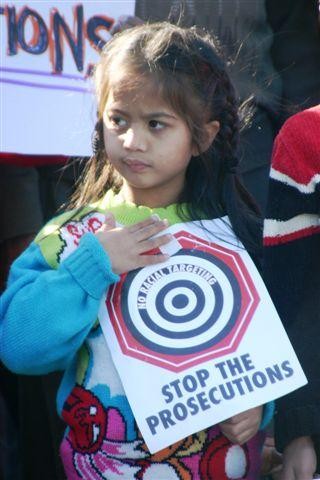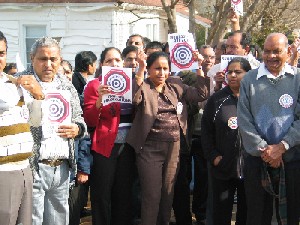Feature:
Federal
Meth
Precursor
Sting
Targeting
South
Asian
Convenience
Stores
Draws
Protests,
ACLU
Intervention
1/13/06
For several dozen hard-working South Asian immigrants and their families in northwest Georgia, the American dream has turned into a nightmare. Caught up in the federal government's war on methamphetamine, they now face years in prison followed by deportation for selling legal products -- from cold medicine to matches to antifreeze -- to undercover informants who claim they told them they were going to use the products to home cook methamphetamine. In a case federal prosecutors call Operation Meth Merchant, a grand jury handed down indictments in June charging 49 people and 16 companies with illicitly supplying methamphetamine precursor chemicals. Of those 49 people, 47 are Indian, with many sharing the same last name, Patel. In an area of Georgia where 75% of convenience stores are run by whites, the sting almost exclusively targeted Indians. Of the 24 stores targeted, 23 were Indian-owned.
But there is a problem with that. Many of those indicted speak little or no English, and even the ones who do are unlikely to be up to date on the latest slang developed by methamphetamine cooks and users. The sting started producing a backlash from the beginning with coverage in the New York Times and a call to arms from the Drug Policy Alliance last summer. The ACLU got involved in November and is now helping to represent two defendants, and industry and South Asian associations have joined the cause. But in scenes depressingly reminiscent of the early trajectory of the now infamous Tulia, Texas, drug bust, where dozens of people went to prison based on the perjured word of an itinerant undercover cop before justice was eventually achieved, some of those charged in Operation Meth Merchant have already pleaded guilty to charges they barely understood and now face years in prison followed by deportation. "I have already watched people plead guilty to these charges, and they needed translators in court because they couldn't understand what the judge was saying," said Deepali Gokhale, campaign organizer for Raksha, a Georgia-based South Asian community association. "How are we to believe that they understood the coded slang of the undercover informant? Imagine you are in France, you barely know the language, or perhaps not at all, and someone comes up to you and starts talking in French drug slang. This is just bizarre," she told DRCNet. Even the judges in the cases are having to have the meth-making slang explained to them, according to court documents, leading one defense attorney, McCracken Poston, to question why immigrants with limited English language abilities were supposed to know terminology sitting judges didn't know. "They're having to tell the court what that means," Poston said. "But they're assuming that the clerks know what it means. I think in most cases they had no idea," he told the Associated Press last weekend. "It is also just ridiculous to assume that the people selling these products are responsible for what their customers are going to do with them," Gokhale said. "And why were these particular stores targeted when the products they're selling are available anyway? You could find the stuff at the convenience store across the street, you can buy it at Walmart. It's more than hard to believe that people making meth are only buying the things they need at Indian-owned stores," she said. Gokhale was suggesting that the targeting of Indians constituted selective prosecution -- prosecutions based on race or national origin -- which is forbidden by the Constitution. That is what drew the attention of the ACLU, too. "There are too many unanswered questions about the validity of evidence against these store clerks for the prosecutions to go forward in good conscience," said Christina Alvarez, a staff attorney with the group's Drug Law Reform Project when it announced it was joining the case in November. "We have launched a full investigation to determine the extent of police misconduct in this ill-conceived operation." ACLU Drug Law Reform Project attorneys this week told DRCNet they could not speak to the facts in the case because they are now representing two of the defendants. But if the group is successful in arguing selective prosecution, it could result in the dismissal of charges in the case. Federal prosecutors deny any wrongdoing and say the operation was aimed not at Indian merchants but at cracking down on the meth problem. "The United States Attorney's Office prosecutes cases based on the evidence and the law, not the defendant's race, ethnicity or last name," Patrick Crosby, a spokesman for US Attorney David Nahmias, said Sunday in a statement. "We continue working to resolve the dozens of individual cases that are part of the Meth Merchant investigation." Still, the case is drawing the attention of Indian organizations far beyond Georgia. "To us, anyway, this looks like an example of selective enforcement against a vulnerable immigrant community and we are working to raise awareness of this wrong and provide support to the community," said Deepa Iyer, executive director of South Asian American Leaders of Tomorrow, a national organization dedicated to the full and equal participation of South Asians in US political and cultural life. "We've been reaching out to the South Asian community at large to provide information about what is going on and to create national awareness of these prosecutions," she told DRCNet. "Along with the South Asian Network in Los Angeles, we put out a statement to make clear this is an issue that goes beyond Georgia and affects the entire South Asian community."
And now, supporters of the Meth Merchant victims have opened a new front in the struggle to quash the prosecutions. Last Sunday, more than 300 people gathered in front of a shopping mall in Decatur, Georgia, to protest the operation. Speaker after speaker denounced the busts as discriminatory and unfair amid signs proclaiming "Stop the Prosecution!" and Hindi civil rights chants that translate to "Against every oppression and injustice, we will fight." "We are not coming from a criminal background," Upendra Patel, president of Georgia's Asian-American Convenience Store Association, told the crowd. "We have thousands of years of culture and civilization, and we do not know what this drug is about. Putting some innocent people behind bars is not going to solve the drug problem." "Ours is but the latest community targeted and blamed in the drug war, a war that has corrupted our institutions to the point where we are willing to send innocent people to prison for the sake of politics and creating a false sense of security," said Raksha executive director Aparna Bhattacharyya. "It was a great rally," said Gokhale. "We had a lot of people there and got a lot of media attention, and it was really, really empowering for these people. This was our first public outcry, so we were really focused on the South Asian community, but we are working with other immigrant and people of color communities. We had several African-American speakers come out to support us, and we've gotten some support from the Latino community, but for people to come out protest anything is scary for people these days if they're not citizens. But I think we got our message out that we are not going to stand for racial targeting."
| |||||||||||||||||||||||||||||||||||||||||||||||||||||||||||||||||||||||||||||||||


